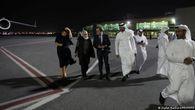
Afghanistan: Taliban release Austrian far-right extremist
An 84-year-old Austrian man who traveled to Afghanistan last year and was arrested there was released by the country’s Taliban rulers, the Austrian government said Sunday.
Austrian Chancellor Karl Nehammer thanked the Emir of Qatar Sheikh Tamim bin Hamad Al Thani and his team for their “strong support” in releasing the individual.
“It is only due to our trusted collaboration that this Austrian citizen will be able to return home to his daughter and grandchildren,” Nehammer said in a post on X, formerly known as Twitter.
The Austrian Foreign Ministry said the released man arrived in the capital Doha from Afghanistan on Sunday afternoon. If necessary, he will be given medical treatment before continuing on to Austria, it said.
What was the far-right extremist doing in Afghanistan?
Austrian newspaper Der Standard reported last year the man had been arrested in Afghanistan after he traveled there in May.
The man, identified as Herbert Fritz by Austrian officials, is a veteran far-right extremist and was a co-founder of a far-right party, the National Democratic Party, that was banned in 1988.
The Austrian newspaper first reported on the case last year and said that Fritz had been held in custody for a few weeks by that time, which was in June 2023.
He was arrested shortly after a far-right magazine published an article he wrote titled “Vacation with the Taliban” in which he gave a positive view of life in Afghanistan under Taliban rule.
According to the Der Standard report last year, Fritz was accused of spying. Austrian neo-Nazis made his case public via Telegram channels.
Qatar pleased by decision of ‘caretaker government’
Qatar’s Foreign Affairs Ministry said in a statement on X that it was “pleased by the decision of the caretaker government” in Afghanistan to release the Austrian.
“The State of Qatar has proven, regionally and globally, that it is a trusted international partner in various important issues,” it said, adding that it encourages Afghanistan to pursue a “constructive dialogue approach to achieve the aspirations of the Afghan people.”
Qatar allowed the Taliban to open an office in Doha in 2013, but the fall of Kabul has put Doha in a unique position, with some accusing the country of abetting international terrorism.
The Taliban seized power in 2021, after US and NATO forces withdrew following two decades of war. No country recognizes them as Afghanistan’s government.
The Taliban shunned a UN conference in Doha earlier this week after the UN rejected its demands of excluding Afghan civil society members from the talks, among other things.
Source » dw.com





